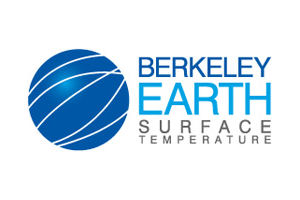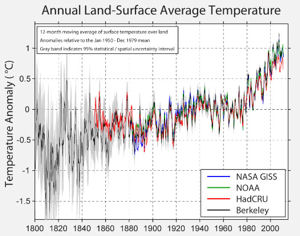Rethinking AGW, Part 2: The BEST Data on Rising Temperatures
 | | There's really no shortage of visual metaphors on Google |
Even the most basic premises of the manmade global warming hypothesis is a subject of intense debate, at least among the general public if not the scientific community. Today, let's stick to where the debate ultimately begins: namely, average global surface temperatures. For nearly the entire history of AGW, the data for average global surface temperatures has been analyzed and reported by three major organizations (NASA, the NOAA, and the CRU) and the conclusions of these organizations have been the sole basis for the UN's IPCC reports on global climate change. However, there have been numerous criticisms of these groups, their motives and methods, their data sets, and most importantly, the conclusions they have reached.
Some of the most compelling skepticism concerns station quality. A group headed by infamous global warming skeptic Anthony Watts determined that as much as 70% of the most important temperature stations in the United States alone have such poor quality that the margin of error for their readings is at least three times higher than the 0.6 Celsius degree increase of global temperatures discussed in IPCC reports. Of course, Anthony Watts isn't above his own criticisms, but the concerns he has raised deserve more than a dismissive attitude from supposedly unbiased observers.
Enter the Berkeley Earth Surface Temperature project (BEST). Headed by Richard Muller and funded by a wide range of sources (from Bill Gates' Fund for Innovative Climate and Energy Research to the Charles Koch Foundation), Berkeley Earth aims to address well-founded skepticism that has for too long been ignored and dismissed. Muller and his team have been very careful to avoid political influence and drawing unwarranted conclusions. Doing their best to correct for poor station quality, the urban heat effect, sporadic and unreliable data, and much else, the teams at Berkeley Earth conducted possibly the largest and most extensive review of climate data in human history. Their conclusion? According to their published results, global land surface temperatures have indeed risen over the last 50 to 60 years in a statistically significant way, leading to an average increase of over 0.9 degrees Celsius.
 | | B.E.S.T.: cute acronyms don't automatically make good science, but they help |
However, as Muller is quick to point out, the Berkeley Earth conclusions make no determinations about ocean temperatures (though it is largely suspected that global ocean temperatures have been much slower to change than land temperatures) and, even more importantly, say nothing about the ultimate causes of the observed increase. What makes the Berkeley Earth data so compelling, aside from its immense size and thoroughness, is its unprecedented transparency. Anyone with Internet access can freely visit the BEST website (http://berkeleyearth.org/) and examine the data and methods for themselves. This is a far more open approach to the issue of global climate change than, for example, the approach of the CRU, which has been doing its best to ignore FOIA requests from outsiders and insulate their data and methods from the general public, which lead to the so-called "Climategate" scandal.
Berkeley Earth makes it much harder for hard-line skeptics and outright deniers to thrive, because they act in a far more scientific way, preventing the festering conspiracy theories that overzealots and alarmists have sparked by their disdain for even the most legitimate skepticism. Indeed, nowhere will you find Richard Muller or his team arguing that the case for AGW is open-and-shut or that the debate is over, arguments that infuriate the truly open-minded. Muller even penned an op-ed for the Wall Street Journal (the title of which was changed without his permission) in which he outlines the many valid reasons people have a right to be skeptical about the AGW narrative. In fact, there are encouragements all over the Berkeley Earth website to think for yourself, to analyze their data, and to criticize it wherever you can. There are even lists of things that the Berkeley Earth project is unable to account for, such as contentious tree ring data, climate model accuracy, and of course the human contribution to global surface temperatures.
As a result, it is virtually impossible to dismiss Berkeley Earth's conclusions. Still, many have tried. One common refrain is that there has been no significant change in global temperature in the last fifteen years. On its face, this assertion is technically true using BEST data, but it is dubious. Climate doesn't move in a linear and predictable fashion, especially in relatively short time spans. Just as it is patently ludicrous to blame a single cold winter on global cooling or a single year of heavy hurricane activity on global warming, it isn't useful to draw conclusions from short-term changes. The only way to really analyze climate trends today is through much longer time-frames, and when you do that, it is obvious that temperatures have been on a steady incline since the mid-Twentieth Century. Anyone can set an arbitrary starting point and ending point to make a talking point (for example, you can say global temperatures have increased by two whole degrees since 1809 or you can say that it went down nearly one whole degree from 1827 to 1976), but that is a cheap and manipulative way to make an argument. One look at Berkeley Earth's graph makes that clear.
 | | Image courtesy of Berkeley Earth |
Still, some remain startlingly dismissive, such as Anthony Watts, who has written sharp criticisms of BEST even while admitting that few AGW skeptics argue against rising global temperatures. On one hand, it seems to me that Watts is engaging in investment justification--pettily clutching to his claims at all costs to avoid having to admit that he is wrong--but on the other hand, I have to admit that Watt's assertions go over my head (as does the raw BEST data, to be honest). Watt's biggest, non-technical complaint is that Richard Muller is thwarting the normal peer review process by putting BEST conclusions online with maximum publicity before the data can go through the normal scientific process. Personally, I think Muller's approach is more in-line with open scientific debate than a closed series of reviews behind the scenes, and I find it odd that any AGW skeptic would complain about that while simultaneously arguing that the scientific process has been tainted by the politics of alarmism.
Given that, I must conclude that the true story has yet to be fully told, that the science has not yet unfolded into an ultimate truth. I do think it is safe to assume that, unless more evidence comes to light that contradicts the general findings of NASA, the NOAA, the CRU, and BEST, average global surface temperatures are probably on the rise. What is causing this and what it means are still open questions that I will address in the coming months, but for now, I will resist knee-jerk denialism and say that I am content to agree with the apparent consensus on this particular premise of the AGW hypothesis. While I will not say the debate is over, I will say that the world is, it seems, getting warmer.
-e. magill 12/20/2011
|
|